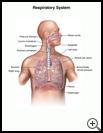
Acute Bronchitis
________________________________________________________________________
KEY POINTS
- Acute bronchitis is swelling and irritation of the airways (bronchial tubes) which connect the windpipe to the lungs. Acute bronchitis may also be called a chest cold.
- Acute bronchitis often does not need medical treatment. You may be able to treat your symptoms at home. Talk to your healthcare provider if your symptoms are severe or if you have another medical condition such as heart or lung disease or diabetes.
- Drink plenty of liquids and rest at home. Ask your healthcare provider what symptoms or problems you should watch for and what to do if you have them.
________________________________________________________________________
What is acute bronchitis?
Acute bronchitis is swelling and irritation of the airways (bronchial tubes) which connect the windpipe to the lungs. Acute bronchitis usually goes away within a few weeks with treatment. Acute bronchitis may also be called a chest cold.
A different form of bronchitis, called chronic bronchitis, is a long-term condition that causes breathing problems. Chronic bronchitis is one type of chronic obstructive pulmonary disease (COPD) and is usually caused by smoking.
What is the cause?
Acute bronchitis is usually caused by viral infections that affect the lungs. Less often, it may be a bacterial infection.
Acute bronchitis is most common during the winter or when the level of air pollution is high.
People who have a higher risk for bronchitis include:
- Infants, young children, and older adults
- Smokers
- People with heart disease
- People with allergies, asthma, or other lung diseases
What are the symptoms?
Symptoms may include:
- A deep cough with yellowish or greenish mucus
- Pain in your chest when you breathe deeply or cough
- Wheezing or feeling short of breath
- Fever and chills
- Headache
- Body aches
How is it diagnosed?
Your healthcare provider will ask about your symptoms and medical history and examine you. You may have tests, such as:
- Chest X-ray
- Blood tests
How is it treated?
Acute bronchitis often does not need medical treatment. You may be able to treat your symptoms at home:
- Get plenty of rest.
- Drink plenty of clear liquids unless your healthcare provider has told you to limit liquids. Water, broth, juice, electrolyte solutions, and non-caffeinated drinks are best. If you have a fever, your body needs more liquid because you can get dehydrated.
- Talk to your healthcare provider if your symptoms are severe or if you have heart disease, asthma, chronic bronchitis, kidney disease, diabetes, or another chronic medical problem. You may need to take antibiotic medicines. If you are wheezing, you may need an inhaler medicine to make it easier to breathe.
Most of the time acute bronchitis clears up in several days. Your cough may slowly get better in 1 to 4 weeks. It may take you longer to recover if:
- You are a smoker.
- You live in an area where air pollution is a problem.
- You have a heart or lung disease, including asthma.
- You have other health problems.
How can I take care of myself?
Follow the full course of treatment prescribed by your healthcare provider. In addition:
- Use a humidifier to put more moisture in the air. Avoid steam vaporizers because they can cause burns. Be sure to keep the humidifier clean, as recommended in the manufacturer's instructions. It's important to keep bacteria and mold from growing in the water container.
- Drink plenty of liquids. Ask your healthcare provider about how much liquid you should drink each day.
- Take cough medicine if recommended by your healthcare provider. Cover your cough.
- Don’t smoke, and stay away from others who are smoking.
- Avoid breathing dust and chemical fumes.
- Get extra rest.
- Take nonprescription medicine, such as acetaminophen, ibuprofen, or naproxen to treat pain and fever. Read the label and take as directed. Unless recommended by your healthcare provider, you should not take these medicines for more than 10 days.
- Nonsteroidal anti-inflammatory medicines (NSAIDs), such as ibuprofen, naproxen, and aspirin, may cause stomach bleeding and other problems. These risks increase with age.
- Acetaminophen may cause liver damage or other problems. Unless recommended by your provider, don't take more than 3000 milligrams (mg) in 24 hours. To make sure you don’t take too much, check other medicines you take to see if they also contain acetaminophen. Ask your provider if you need to avoid drinking alcohol while taking this medicine.
Ask your provider:
- How and when you will get your test results
- How long it will take to recover
- If there are activities you should avoid and when you can return to your normal activities
- How to take care of yourself at home
- What symptoms or problems you should watch for and what to do if you have them
Make sure you know when you should come back for a checkup. Keep all appointments for provider visits or tests.
How can I help prevent acute bronchitis?
To reduce your risk of getting a lung infection:
- Wash your hands often and especially after using the restroom, coughing, sneezing, or blowing your nose. Also wash your hands before eating or touching your eyes.
- Stay at least 6 feet away from people who are sick, if you can.
- Stay indoors as much as possible on high-pollution days.
- Take care of your health. Try to get at least 7 to 9 hours of sleep each night. Eat a healthy diet and try to keep a healthy weight. If you smoke, try to quit. If you want to drink alcohol, ask your healthcare provider how much is safe for you to drink. Learn ways to manage stress. Exercise according to your healthcare provider's instructions.

